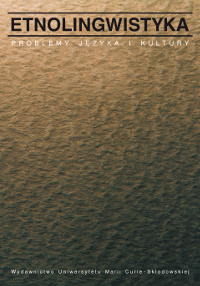Стереотип поляка глазами литовцев
THE STEREOTYPE OF A POLE IN THE EYES OF LITHUANIANS
Author(s): Marija Zav'jalova, Lajma AnglickeneSubject(s): Anthropology, Language studies, Language and Literature Studies, Applied Linguistics
Published by: Wydawnictwo Naukowe Uniwersytetu Marii Curie-Sklodowskiej
Keywords: NATIONAL POINT OF VIEW; QUESTIONNAIRE; STEREOTYPE OF A POLE
Summary/Abstract: The article presents the stereotype of a Pole in Lithuania, reconstructed on the basis of linguistic data, historical sources, press articles and folklore, in which the contemporary consciousness of Lithuanians is reflected in several ways. The authoresses have also conducted a questionnaire among students in Vilnius, making use of some of the questions from the Lublin LAS questionnaire (the ethnonym and its understanding, its synonyms, the characteristics and appearance of a typical representative, the valence of the expressions 'the Polish way' or 'like a Pole', the ways of complementing the formula 'he/she is a Pole but...', jokes and proverbs), and enriched it with questions about symbolic figures.The basic factors shaping the stereotype of a Pole and Poland in Lithuania were historical events, a strong and long-lasting influence of Poland on Lithuania in numerous spheres of life. The stereotype of a Pole has taken shape as a reflection of the resistance of Lithuanians to the process of Polonization, a resistance gaining in strength since the end of the 19th century, as well as of the development of nationalistic ideology in Lithuanian society. The Lithuanian stereotype of a Pole embraced various aspects of clear axiological overtones: social (a Pole used to be a member of the gentry, a persons of higher rank, now: a tradesman, businessman, thief), physical (a characteristic appearance, e.g. clothes), psychological (traits of character and patterns of behaviour, among which dominate conceit, the feeling of superiority over Lithuanians, cunningness and craft), ideological (excessive piety). Particular attention is paid to the Polish language, which is reflected in numerous paraphrases, parodies and sayings. The attitude of Lithuanians to Poles rests on the fear of a possible threat from the latter. A negative stereotype of a Pole has arisen from the historical complex of a suppressed nation. It is interesting that the complex surfaces in relation to Lithuanian-based Poles but not in relation to Poland as a country, which Lithuanians perceive in mildly positive terms and even take pride in the common past of the two nations.
Journal: Etnolingwistyka. Problemy Języka I Kultury
- Issue Year: 17/2005
- Issue No: 17
- Page Range: 145-186
- Page Count: 42
- Language: Russian

